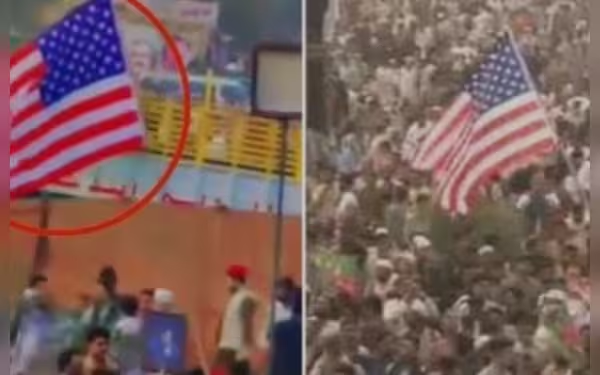Saturday, November 16, 2024 05:52 PM
PTI Rally Controversy: US Flag Sparks Political Tensions in Swabi
- US flag display at PTI rally ignites political debate.
- PTI leaders face internal conflict after rally incident.
- Critics accuse PTI of prioritizing foreign interests.
 Image Credits: pakobserver.net
Image Credits: pakobserver.netThe PTI rally in Swabi featuring a US flag has sparked significant political tensions and internal conflicts within the party.
The recent political rally held by the Pakistan Tehreek-e-Insaf (PTI) in Swabi has ignited a fierce debate among political opponents, primarily due to the controversial display of the US flag. This incident has not only raised eyebrows but has also led to a flurry of accusations and counter-accusations among various political factions in Pakistan. The PTI, led by Imran Khan, has been known for its strong stance against foreign influence, making this display particularly shocking to many of its supporters.
During the rally, the appearance of the US flag was interpreted by some as a sign of allegiance to American interests, which has historically been a sensitive topic in Pakistani politics. Critics have pointed out that this act reflects a troubling dependence on foreign powers, suggesting that PTI leaders may be prioritizing their relationship with the United States over the interests of the Pakistani people. In response to the backlash, a PTI spokesperson confirmed that the party does not support such displays and that action would be taken against the individual responsible for raising the flag.
The fallout from this incident has been significant. Following the rally, which reportedly saw a disappointing turnout, tensions among PTI leaders have escalated. Notably, Ali Amin Gandapur and other prominent figures within the party have begun to publicly criticize one another, indicating a rift that could have serious implications for the party's unity moving forward. This internal conflict highlights the challenges PTI faces as it navigates its political identity amidst growing scrutiny.
As the political landscape in Pakistan continues to evolve, incidents like the one at the Swabi rally serve as a reminder of the delicate balance between national pride and international relations. The display of the US flag has not only sparked a war of words among political opponents but has also prompted a broader discussion about the role of foreign influence in Pakistan's domestic affairs. It is crucial for political parties to remain vigilant and responsive to the sentiments of their constituents, ensuring that their actions align with the values and expectations of the Pakistani populace.
The raising of the US flag at the PTI rally in Swabi has opened a Pandora's box of political discourse, revealing underlying tensions within the party and among its rivals. As the situation unfolds, it will be interesting to see how PTI addresses this controversy and whether it can mend the rifts that have emerged. Ultimately, the incident serves as a potent reminder of the complexities of political allegiance and the importance of maintaining a strong national identity in the face of external influences.













